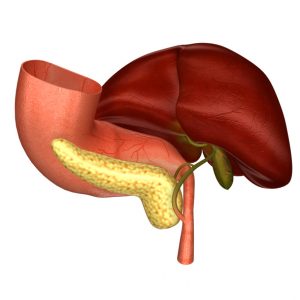
The salts found in bile can emulsify fat and break it down into smaller particles. Bile can help the body absorb those broken down products of fat within the gut.
As mentioned, bile is produced in the liver, and from there it can travel through the digestive tract to aid in digestion or waste removal. The liver produces between 600 ml to one liter of bile.
The liver constantly secretes bile, but most of it is stored in the gallbladder. The gallbladder can hold between 30 to 60 ml of it – it can sometimes hold larger quantities by concentrating it. This concentration is five to 20 times greater than the bile found in the liver.
Bile contains salt, water, bilirubin, cholesterol, fatty acids, lechithin, sodium, potassium, calcium, chlorine, and bicarbonate acids.
Foods that may increase bile production in the liver
Bile production is largely based on the foods we eat. Certain foods can increase bile production. These foods include celery, radish, and artichokes. A high-fat diet and foods with certain types of fat like polyunsaturated fat also work to decrease cholesterol.
Here are some tips to naturally increase your liver’s bile production:
- Drink a glass of water with lemon upon awakening
- Avoid eating sugars and processed foods
- Consume bitter foods
- Eat garlic, onions, and carrots
- Drink tea made from dandelion, peppermint, green tea, or ginger
- Drink buttermilk and eat yogurt
Tips to keep your liver healthy
Below you will find helpful tips that can help keep your liver healthy.
- Don’t drink too much alcohol
- Don’t overindulge in fatty foods
- Be mindful of medications
- Don’t touch or breathe in toxins
- Don’t smoke and avoid second-hand smoke
- Eat foods high in selenium, such as Brazil nuts, brewer’s yeast, brown rice, garlic, onions, and molasses.
- Eat foods high in methionine as they can detox the liver. These foods include eggs, fish, legumes, and seeds.
- Consume high sulfur foods, such as broccoli, cauliflower, cabbage, and Brussels sprouts for further detoxifying effects.
- Foods with vitamin B5, including whole grains, chicken, wheat bran, and nuts.
- Foods high in vitamin B1 that can reduce toxic effects, such as wheat germ, peas, and soybeans.
- Consume coffee, as it contains phytonutrients – be mindful of additives such as cream, milk, and sugar, and don’t have more than three cups a day.